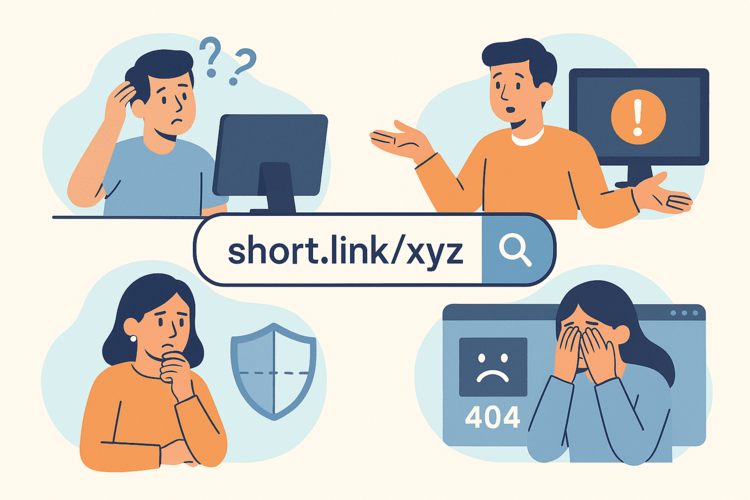Do Short Links Pass SEO Value?
Short (shortened) links that were created using URL shortening services do not have direct SEO value, but in some way they can affect SEO in general.
Search engines like Google usually follow redirects (especially 301), so the final URL can get some of the "weight." However, shortened URLs often have redirects (301/302) through third-party services (link shorteners). Sometimes, they contain the rel="nofollow" attribute, which blocks the transfer of SEO value. The shortened link itself does not affect the positions in Google.
What indirect SEO value is there anyway? Shortened links can increase traffic, because short URLs look attractive on social networks, emails, and printed materials, stimulating user clicks.
Shortened links stimulate sharing. They are easier to copy, remember, and paste, which helps your content be more widely distributed.
If you use your domain, shortened links strengthen your brand.
Shortened links don’t directly improve your rankings, but they can help your SEO indirectly by increasing traffic, making it easier to share, and enhancing engagement with your audience. In that case, they can be quite useful for your promotion.
.png)
SEO Risks of Using URL Shorteners
Link shorteners are convenient, but they come with potential risks for SEO and your long-term traffic strategy
Lost PageRank. If you use a 302 redirect (temporary) or add the rel="nofollow" attribute, search engines don’t give “weight” to the target page. Many popular shorteners (e.g. Bitly, TinyURL) use these methods to control the link. Therefore, choose services that use 301-redirect (permanent) without nofollow.
Dependence on a third-party service. If the shortening service stops working or blocks access (like Google with goo.gl), all links become “dead”. This negatively affects the page’s search authority. Therefore, choosing a reliable link shortener and not trusting free short-term projects is worth it.
Less trust from search engines and users. Shortened URLs can look suspicious to both Google and users (due to the risk of phishing). This can affect CTR in search results.
To check the reliability of short links, use the short link security checker service
Risk of Blocking in Social Networks or Web Browsers Some shortened links (especially massive or through little-known services) can be blocked as suspicious, for example, on Facebook, Instagram or even by antiviruses. Therefore, use proven services for shortening long links, for example, surli.
Shortened URLs are convenient, but for SEO they can carry risks, especially if used thoughtlessly or through unreliable services. For safety and reliability, use 301 redirects, also check for nofollow, track analytics through proven tools, and use your own subdomain for link shortening if possible.
Best Practices for SEO-Friendly Short Links
To make your shortened links as SEO-friendly as possible, use a permanent 301 redirect, as it is the one that passes PageRank and other SEO signals to the target page. Most search engines handle 301 correctly and take it into account for ranking. Avoid 302 (temporary) redirects unless you have a clear reason.
You can also use your own domain or subdomain. This allows you to maintain control over the links and strengthen your brand.
Avoid the rel="nofollow" attribute. If you control the short link, do not use nofollow if you want SEO effect.
To improve SEO performance, add a descriptive slug instead of random characters. This helps users understand the content before clicking, while also increasing CTR and building trust.
Example:
Hosting company Hyperhost in its advertising of remote desktops can use either the direct link https://hyperhost.ua/en/windows-vds or shorten it and use the concise https://surl.li/hyper-rdp
Such a URL looks simple and takes a minimum of characters (important in SMS, Twitter), and now you can track the number of clicks using the surl.li/hyper-rdp+ parameter
Avoid excessive redirects, as multi-level redirects reduce loading speed and can cause indexing problems.
Be sure to make sure that short links do not lead to 404/500 pages. Search engines and users negatively perceive “broken” links. Regularly check the performance of shortened URLs.
It’s also important to integrate analytics to avoid losing SEO traffic data, either by adding UTM tags or by using URL shorteners that support analytics.
But the main rule to follow when using shortened links is to choose the right and stable shortening service. Monitor the security and reputation of the link shortening service. The shortener must be reliable, without the risk of closure (as happened with goo.gl). Some services are blacklisted by social networks and antivirus software, so it's important to choose a URL shortener carefully.
.png)
Common Myths About Short Links and SEO
If you are still not convinced of the benefits of using shortened links, we will consider the main myths about short links and, of course, debunk them.
1: Do short links directly improve SEO? Shortened URLs have no direct impact on a site's ranking in search engine results. It only redirects to the real page, which is evaluated by Google.
2: Do all redirects convey SEO value? Only the 301 redirect (permanent) conveys SEO weight (PageRank). Redirects of type 302 do not convey or partially convey SEO value.
3: Does Google not index short links? Google can index short URLs if there is permission to crawl (without nofollow), and short links lead to indexed content. But the short URL itself is rarely ranked - the target page is indexed.
4: Is a short link always safe? If a URL shortener has a poor reputation, its links may be blocked by antivirus programs, browsers, or social platforms. It also masks the final address, which can cause distrust in the user.
5: Does the length of the URL affect ranking? Google does not penalize long URLs, but shorter, more understandable links have a higher CTR. This is an indirect factor that can boost SEO by increasing the number of clicks.
6: Are all link-shortening services the same? Choosing a link shortening service is extremely important. Different services vary in functionality and reputation across the web. Therefore, you should choose a URL shortening service that offers the right features and is both reliable and secure.
7: Do you not need to monitor old short links? "Dead" short links (leading to 404) harm your reputation and user experience. They need to be checked and updated over time.
Short links are convenient, but they cannot be perceived as a promotion tool in themselves. They have an indirect impact on SEO through convenience, click-through rates (CTR), and online distribution. The real benefits come from using shorteners competently, together with tracking tools and brand integration.


.png)

